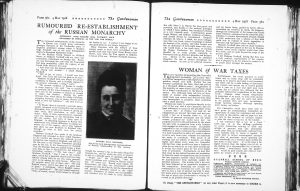Diplomatic Transcription
INTERVIEW WITH MADAME OLGA NOVIKOFF, ONCE DESCRIBED BY DISRAELI AS THE “M.P. FOR RUSSIA.”
THE rumoured reinstatement of the monarchy in Russia has evoked great excitement amongst Russians of the Nationalist party in England, prominent among whom is Madame Olga Novikoff, one of the most distinguished figures in European diplomatic circles.
At the Russian Greek Church in Welbeck Street, so Madame Novikoff told me, there was tremendous enthusiasm on Sunday last. Everyone was discussing the news that the Tsarevitch had been proclaimed, under the regency of the Grand Duke Michael, his uncle.
“And what was the general expression of feeling among your friends?” I asked Madame Novikoff.
“Oh! of joy, of course. I myself was overjoyed. But I fear the news too good to be true.”
Madame Novikoff feels very deeply the present conditions in Russia, and is strongly opposed to the present, self-styled “ruling” party.
“The present condition of Russia is terrible in many respects,” she said, “but to repudiate so cynically all her most elementary debts, as is done now by the wreckers of Russia, is enough to make one shudder. During the great Crimean War, when almost the whole of Europe, excepting Germany, was an enemy, Russia never failed to meet her liabilities.” She then went on to say:—
“In Russia there is naturally a patriotic party, largely composed of the Nationalists and so-called Slavophils, who would never dream of giving up their creed, their patriotism, or other moral duties. Many of these representatives, especially since the beginning of the Revolution, had to flee the country, and some of them came to England. In obtaining passports in Russia they experienced very serious difficulties in taking any money out of the country, and it thus happens that there are now Russians in England who, through no fault of their own, are almost penniless.”
Madame Novikoff then spoke of the kindness England had extended to these exiled Russians. In six months she herself has collected £2,000 among her own friends in England, and this sum she has sent to the Famine Committee presided over by her son, in the Government of Tamboff. That the Russian does not quickly forget a kindness done to him is illustrated by the following interesting incident:—“The last time,” said Madame Novikoff, “that I was at my country place, which has a beautiful church and two magnificent schools built by my son, some peasants came to me asking for some favour. What was my surprise when one of them said: ‘We had English money, and it has done us a great deal of good.’ I exclaimed, ‘What English money are you speaking of?’ The man looked surprised. ‘Why, of course, money which helped us through the famine in 91.’ I confess I was happy to see that good deeds are not always forgotten.”
Many Russians with the welfare of their country much at heart have succumbed to the terrible trials that have beset Great Russia since March, 1917, when the Tsar agreed to abdicate in favour of his son. Madame Novikoff, however, though her country’s fate is the main thing that interests her, and for which she lives at present, is full of a splendid spirit of optimism and hope.
“People say,” she remarked, “that the chaotic conditions now existing in Russia cannot last. Of course not. Russia must regain the Government she likes, the Government which supports not only the Church, but the monarchical and patriotic principles sacred to the whole country. Emperors, of course, are not infallible, and mistakes may be made in every direction.
But still, there it is, Russia has been great and powerful, and thanks to the national principles of which I have spoken, has introduced reforms on a very majestic scale. Unfortunately people forget history, and brilliant incidents of history, that should always be remembered. Emperor Nicholas II, who is, I think, the most unhappy man that ever lived, risked everything to defend the honour of his country, and when Austria sent him an ultimatum of forty-eight hours this man, who would insist, a few years since, on starting the Hague Conference for Universal Peace (derided by so many people, especially in Germany) took up Austria’s gauntlet and declared war. Almost at the same time he abolished altogether the sale of alcohol throughout the whole country. As soon as we achieved victories, and our heroic Army, guided by heroic officers, astonished the world by its deeds, the Emperor, through the commander of the troops—the Grand Duke Nicholas—announced to the world his determination to reunite dismembered Poland, though he fully understood that a scheme of that kind could only be realised in severe opposition to Germany and Germany’s slave—Austria.”
Madame Novikoff then told me many incidents relating to the part played in the war by Russian women, whose heroic exploits would more than fill a book, and are quite beyond the scope of the present article.
I left Madame Novikoff, feeling that here was a truly patriotic representative of her country who is prepared to do her utmost to restore it to its proper place amongst the nations.
Essay Subjects
People Mentioned in the Essay
- Alexander Ivanovich Novikoff
- Grand Duke Mikhail Aleksandrovich Romanov
- Grand Duke Nikolay Nikolaevich Romanov
- Tsarevich Alexei Nikolaevich Romanoff
- Tzar Nicholas II Aleksandrovich Romanov of Russia
Cities Mentioned in the Essay
Citation
Novikoff, Olga. “Rumoured Re-establishment of the Russian Monarchy.” Interview. The Gentlewoman (London), May 4, 1918.
Facsimile Image


